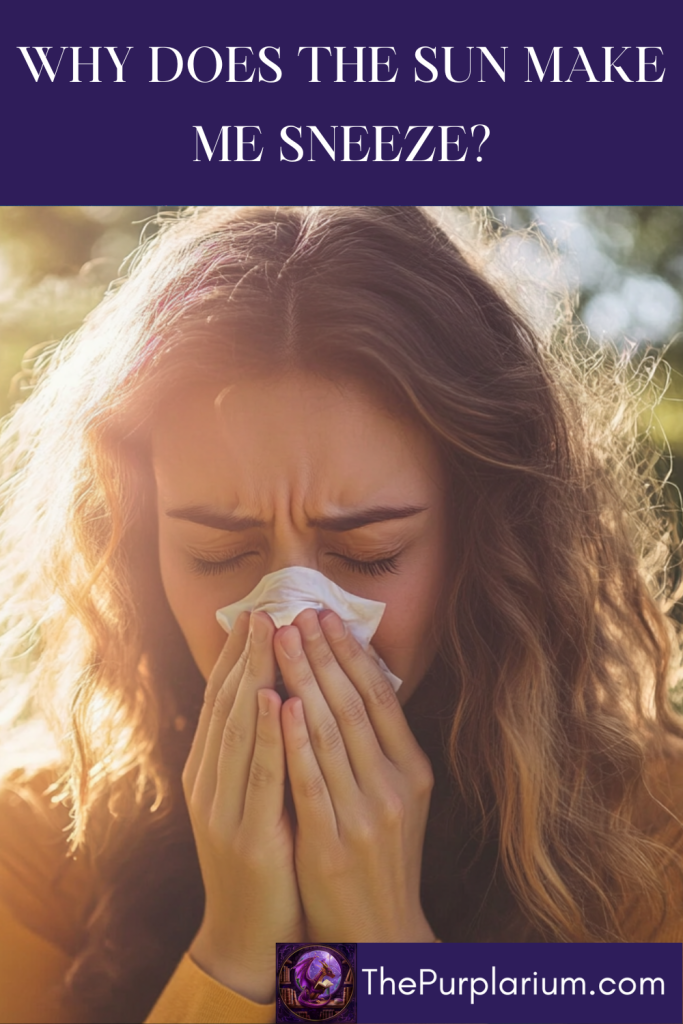Have you ever felt a sneeze coming on when you step into bright sunlight? You’re not alone. Some people sneeze every time they look at the sun or a bright light. I’m one of those people. And it’s always a giant sneeze or a series of big, eye-watering sneezes.

This odd reaction has many names, including “sun sneezing” and “photic sneeze reflex.” My favorite is ACHOO syndrome. It just speaks to my inner child.
Sun sneezing isn’t just a summer problem. It can happen any time of year when you see bright light. For those who experience it, the sneeze often comes in multiples. While it may seem strange, this reaction is quite common. So next time you feel a sneeze coming on in the sunshine, you’ll know you’re part of a unique group of sun sneezers!
What’s the Photic Sneeze Reflex or Sun Sneeze Syndrome?
Photic sneezing is, quite literally, sneezing when exposed to (usually sudden) bright sunlight. This quirk affects many people. Don’t worry, it’s not harmful; it’s just your body’s odd reaction to light. You might sneeze once or a few times when you see the sun, and it can happen with other bright lights too.
Why Does It Happen?
You might find yourself sneezing when you step into bright sunlight. This odd reaction, called the photic sneeze reflex, occurs due to a mix-up in your facial nerves. When light hits your eyes, it can trigger a sneeze instead of just making your pupils smaller. This sneeze often occurs when you move from a dark place to a bright one. You might experience it when driving out of a tunnel, walking from indoors to a sunny patio, or looking at a camera flash. It’s a genetic trait, so if one of your parents has it, you might too. Scientists are still trying to figure out exactly which genes cause it.
How Many People Have It?
You’re not alone if you sneeze at the sun. This quirky trait is pretty common. Estimates suggest that 15% to 30% of people might have it. It’s more common in people with light skin, and women seem to have it more often. Some people sneeze a lot when they see bright light, while others only sneeze sometimes. You might even have it without knowing!
Are There Any Dangers?
Sneezing itself isn’t risky, but the timing can be. Think about situations like driving, where a sneezing fit could cause an accident. During surgery, bright lights or certain drugs might make you sneeze, and in dental work, the bright light in your face could trigger sneezes. It’s smart to tell your doctor, dentist, and eye doctor if you have this reflex so they can take steps to keep you safe during exams or procedures.
Can You Stop Sun Sneezes?
There’s no cure, but you can try some tricks to manage it. Wearing dark sunglasses or a hat can help, as can treating any allergies you might have. Pressing the area between your nose and upper lip when you feel a sneeze coming can also be effective. Close your eyes for a moment when you first step outside, turn your head away from the sun at first, or go outside slowly to let your eyes adjust. These tricks can help you enjoy sunny days with fewer sneezes. Remember to let your doctors know about your sun sneezes; it’s always better to be safe!
What Makes You Sneeze When You See Bright Light?
Bright light can make some people sneeze due to a mix-up in your body’s signals. When light hits your eyes, it can accidentally trigger your sneeze reflex. Your brain gets confused and thinks you need to sneeze. This mix-up, called the photic sneeze reflex, is like your body hitting the wrong button by mistake.
Do Blue-Eyed People Sneeze More in the Sun?
There’s no strong proof that blue-eyed folks sneeze more in the sun. Eye color doesn’t seem to play a big role in sun sneezing. People with all eye colors can have this sneezing reaction. What matters more is how your nerves and brain react to light, not the color of your eyes.
Is Sun Sneezing Passed Down in Families?
Yes, sun sneezing often runs in families. If your parents sneeze in bright light, you might too. Scientists think there’s a genetic link. However, not everyone in a family will have it. It’s similar to how you might have your mom’s nose but not her curly hair. Genes play a part, but it’s not a sure thing.
